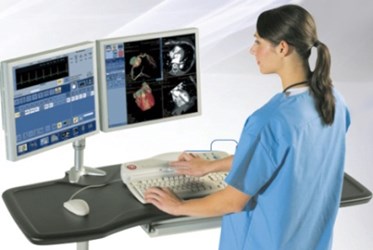FDA Approves GE's Low-Dose CT Device For Lung Cancer Screening
By Jof Enriquez,
Follow me on Twitter @jofenriq

The U.S. Food and Drug Administration (FDA) has granted GE Healthcare's low-dose computed tomography (CT) device a screening indication for the early detection of lung cancer, making GE the first manufacturer to receive such clearance.
“This is the first time in history that any CT device has received FDA clearance for any screening indication,” said Henry Hummel, president and CEO of Molecular Imaging and CT at GE Healthcare, in a statement. “Healthcare providers are looking for solutions beyond just imaging equipment; we look forward to helping them establish low dose CT lung cancer screening programs that will inevitably save lives through earlier diagnosis and treatment for patients.”
GE stated that all new 64-slice-and-greater CT scanners, as well as almost all of its 16-slice CT scanners, will have the screening indication based on internally-developed imaging protocols. Those protocols are gleaned from recommendations by professional medical and governmental organizations, including the U.S. Preventative Services Task Force (USPSTF) and the Centers for Medicare and Medicaid Services (CMS). Moreover, Medicare members who undergo low-dose CT scans for lung cancer screening can now secure reimbursement.
Like other types of cancer, lung cancer that is detected early is linked to better prognoses. Currently, just 15 percent of lung cancer cases are detected at an early stage, and the five-year overall survival rate is only 17 percent. Lung cancer remains the leading cause of cancer deaths in the United States.
GE says its new low-dose CT system will make lung cancer prognosis better by detecting small lung nodules that are indicative of lung cancer at its earliest stages, when it is most treatable. The solution uses GE's ASiR, ASiR-V, and Veo technologies, which reduce image noise. ASiR-V is also used in GE's FDA-cleared Revolution CT for low-dose, whole organ diagnosis, and multi-organ follow-up in oncology patients.
According to GE's website, ASiR, or Adaptive Statistical iterative Reconstruction, is an image reconstruction technique that may allow reducing dose by up to 40 percent across exam types, while maintaining image quality (pixel standard deviation). GE describes Veo as the world’s first model-based iterative reconstruction product.
The company says the National Lung Screening Trial (NLST), which studied 53,000 patients with a history of smoking, demonstrated that low-dose CT lowered lung cancer deaths by 20 percent compared to standard chest X-ray screening.
“Bringing low dose CT screening to patients at a high risk for lung cancer will reduce death from the most deadly cancer worldwide,” said Dr. Ella Kazerooni, chair of the committee on lung cancer screening, American College of Radiology, in the statement. “Performing low dose CT with attention to high image quality at the lowest radiation exposure to detect early cancer is at the core of a successful screening program, and requires collaboration with imaging partners to bring technology to bear for this purpose. The FDA’s clearance of these CT scanners for this purpose illustrates that commitment.”
